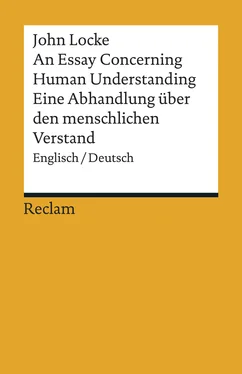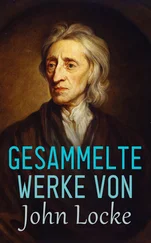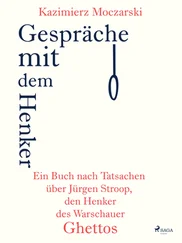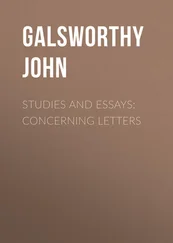§ 2. These are some few instances of those various Modes of thinking , which the Mind may observe in it self, and so have as distinct Ideas of, as it hath of White and Red , a Square or a Circle . I do not pretend to enumerate them all, nor to treat at large of this set of Ideas , which are got from Reflection : […] I shall have occasion hereafter to treat more at large of Reasoning , Judging , Volition , and Knowledge , which are some of the most considerable Operations of the mind, and Modes of thinking .
[…]
O f Modes of Pleasure and Pain
§ 1. AMONGST the simple Ideas , which we receive both from Sensation and Reflection , Pain and Pleasure are two very considerable ones. For as in the Body, there is Sensation barely in it self, or accompanied with Pain or Pleasure ; so the Thought, or Perception of the mind is simply so, or else accompanied also with Pleasure or Pain , Delight or Trouble, call it how you please. These like other simple Ideas cannot be described, nor their Names defined; the way of knowing them is, as of the simple Ideas of the Senses, only by Experience. For to define them by the Presence of Good or Evil, is no otherwise to make them known to us, than by making us reflect on what we feel in our selves, upon the several and various Operations of Good and Evil upon our Minds, as they are differently applied to, or considered by us.
§ 2. Things then are Good or Evil, only in reference to Pleasure or Pain. That we call Good , which is apt to cause or increase Pleasure , or diminish Pain in us ; or else to procure, or preserve us the possession of any other Good , or absence of any Evil . And on the contrary we name that Evil , which is apt to produce or increase any Pain , or diminish any Pleasure in us ; or else to procure us any Evil , or deprive us of any Good . By Pleasure and Pain, I must be understood to mean of Body or Mind, as they are commonly distinguished; though in truth, they be only different Constitutions of the Mind, sometimes occasioned by disorder in the Body, sometimes by Thoughts of the Mind.
[232]§ 3. Pleasure and Pain , and that which causes them, Good and Evil, are the hinges on which our Passions turn: and if we reflect on our selves, and observe how these, under various Considerations, operate in us; what Modifications or Tempers of Mind, what internal Sensations, (if I may so call them,) they produce in us, we may thence form to our selves the Ideas of our Passions .
§ 4. Thus any one reflecting upon the thought he has of the Delight, which any present, or absent thing is apt to produce in him, has the Idea we call Love . […]
§ 5. On the contrary, the Thought of the Pain, which any thing present or absent is apt to produce in us, is what we call Hatred . […]
§ 6. The uneasiness a Man finds in himself upon the absence of any thing, whose present enjoyment carries the Idea of Delight with it, is that we call Desire , which is greater or less, as that uneasiness is more or less vehement. Where by the bye it may perhaps be of some use to remark, that the chief if not only spur to humane Industry and Action is uneasiness. For whatever good is propos’d, if its absence carries no displeasure or pain with it; if a Man be easie and content without it, there is no desire of it, nor endeavour after it; […]
§ 7. Joy is a delight of the Mind, from the consideration of the present or assured approaching possession of a Good […].
§ 8. Sorrow is uneasiness in the Mind, upon the thought of a Good lost, which might have been enjoy’d longer; or the sense of a present Evil.
[234]§ 9. Hope is that pleasure in the Mind, which every one finds in himself, upon the thought of a probable future enjoyment of a thing, which is apt to delight him.
§ 10. Fear is an uneasiness of the Mind, upon the thought of future Evil likely to befal us.
§ 11. Despair is the thought of the unattainableness of any Good, which works differently in Mens Minds, sometimes producing uneasiness or pain, sometimes rest and indolency.
§ 12. Anger is uneasiness or discomposure of the Mind, upon the receit of any Injury, with a present purpose of Revenge.
§ 13. Envy is an uneasiness of the Mind, caused by the consideration of a Good we desire, obtained by one, we think should not have had it before us.
§ 14. These two last, Envy and Anger , not being caused by Pain and Pleasure, simply in themselves, but having in them some mixed Considerations of our selves and others, are not therefore to be found in all Men, because those other parts of valuing their Merits, or intending Revenge, is wanting in them: But all the rest terminated purely in Pain and Pleasure, are, I think, to be found in all Men. […]
[…]
§ 18. I would not be mistaken here, as if I meant this as a Discourse of the Passions ; they are many more than those I have here named: And those I have taken notice of, would each of them require a much larger, and more accurate Discourse. I have only mentioned these here, as so many instances of [236]Modes of Pleasure and Pain resulting in our Minds, from various Considerations of Good and Evil. […]
Of Power
§ 1. THE Mind, being every day informed, by the Senses, of the alteration of those simple Ideas , it observes in things without; and taking notice how one comes to an end, and ceases to be, and another begins to exist, which was not before; reflecting also on what passes within it self, and observing a constant change of its Ideas , sometimes by the impression of outward Objects on the Senses, and sometimes by the Determination of its own choice; and concluding from what it has so constantly observed to have been, that the like Changes will for the future be made, in the same things, by like Agents, and by the like ways, considers in one thing the possibility of having any of its simple ideas changed, and in another the possibility of making that change; and so comes by that Idea which we call Power . Thus we say, Fire has a power to melt Gold, i. e. to destroy the consistency of its insensible parts, and consequently its hardness, and make it fluid; and Gold has a power to be melted […].
§ 2. Power thus considered is twofold, viz . as able to make, or able to receive any change: The one may be called Active , and the other Passive Power . Whether Matter be not wholly destitute of active Power , as its Author GOD is truly above all [238] passive Power ; and whether the intermediate state of created Spirits be not that alone, which is capable of both active and passive Power , may be worth consideration. I shall not now enter into that Enquiry, my present Business being not to search into the original of Power, but how we come by the Idea of it. […]
[…]
§ 4. We are abundantly furnished with the Idea of passive Power , by almost all sorts of sensible things. In most of them we cannot avoid observing their sensible Qualities, nay their very Substances to be in a continual flux: And therefore with reason we look on them as liable still to the same Change. Nor have we of active Power (which is the more proper signification of the word Power ) fewer instances. Since whatever Change is observed, the Mind must collect a Power somewhere, able to make that Change, as well as a possibility in the thing it self to receive it. But yet, if we will consider it attentively, Bodies, by our Senses, do not afford us so clear and distinct an Idea of active Power , as we have from reflection on the Operations of our Minds. For all Power relating to Action, and there being but two sorts of Action, whereof we have an Idea , viz . Thinking and Motion, let us consider whence we have the clearest Ideas of the Powers , which produce these Actions. 1. Of Thinking, Body affords us no Idea at all, it is only from Reflection that we have that: 2. Neither have we from Body any Idea of the beginning of Motion. A Body at rest affords us no Idea of [240]any active Power to move; and when it is set in motion it self, that Motion is rather a Passion, than an Action in it. […] The Idea of the beginning of motion, we have only from reflection on what passes in our selves, where we find by Experience, that barely by willing it, barely by a thought of the Mind, we can move the parts of our Bodies, which were before at rest. […]
Читать дальше












